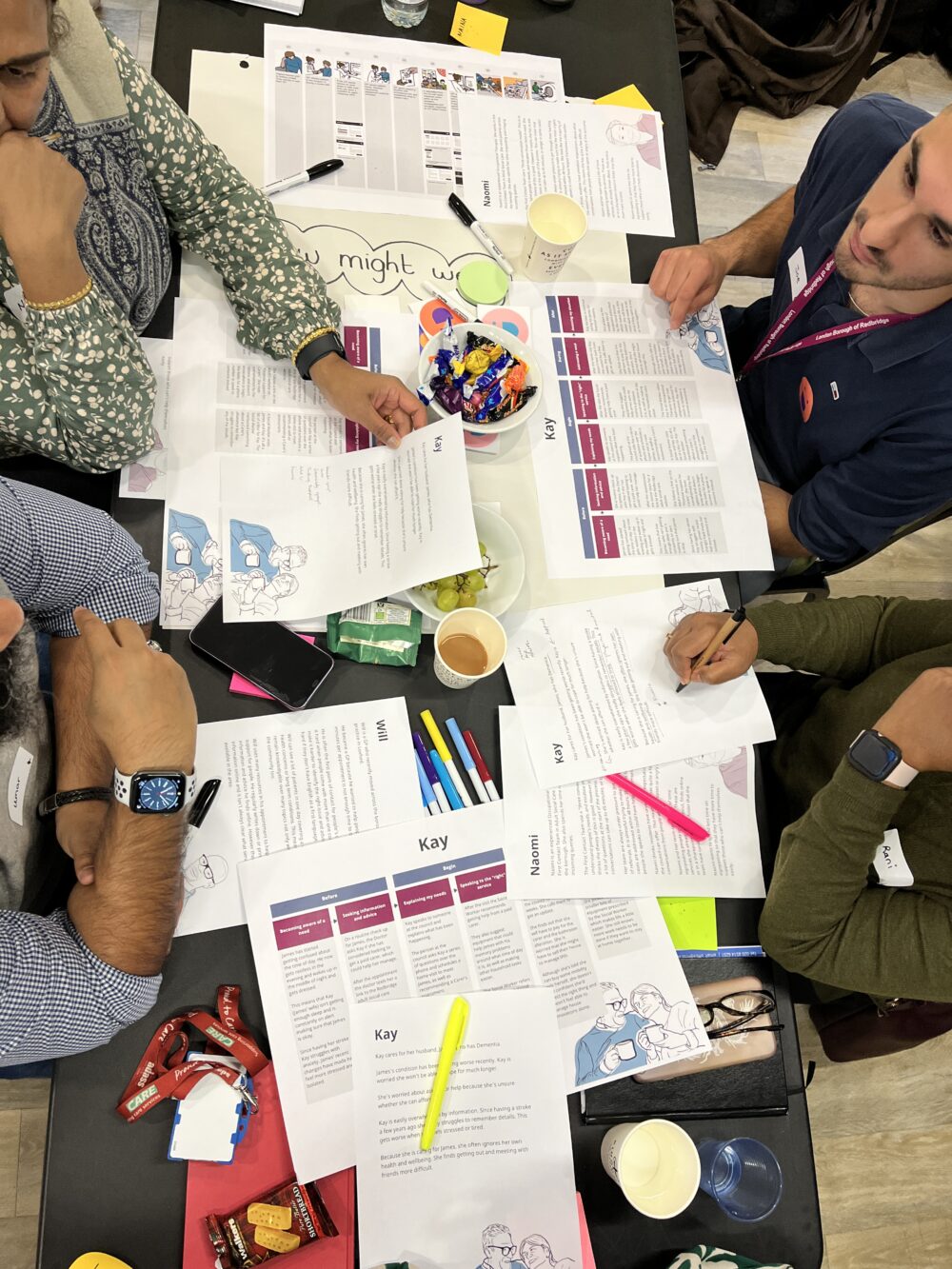
Council staff spend too long on admin and not enough time supporting people
We helped Redbridge Council think differently about how residents could access their adult social care services
The Adult Social Care (ASC) First Contact Team (FCT) at Redbridge Council is facing more support requests than ever from their diverse, ageing population. An issue faced by many councils across the country.
At Redbridge, 80% of calls to the FCT need to be signposted elsewhere, meaning staff are spending too long on admin and less time supporting people. There are also barriers to access for some groups in the community, with data showing that service users are disproportionately from white backgrounds.
To address these challenges with limited resources, the team wanted to explore whether shifting first contact from a phone call to a digital interaction would help them meet their aims of:
- reaching more people from diverse groups
- maximising opportunities for preventative care
- empowering residents to remain independent for longer
Outcome
Our discovery project with the Council transformed the way they thought about the problem – shifting them from addressing a symptom (increased demand for social care) to the root cause. With insights that are valuable for other councils grappling with similar challenges.
What we did
Our approach
We partnered with the team at Redbridge to run a 12 week discovery project funded by a grant from the Local Digital Fund. A condition of the funding was to work closely with 6 other local authorities to ensure our learning and outcomes were shared with other boroughs.
We blended our service design expertise with Redbridge’s subject matter knowledge and worked together to explore common service journeys, user stories and team experiences. Beginning with some desk research around the adult social care landscape and shadowing the FCT.
We agreed with Redbridge that the aim of the work would be to focus on 2 core research questions:
- how can we make sure people are getting the help they need?
- how can we reduce unnecessary contact with the FCT?
Addressing the discovery in this way meant we could understand the underlying causes of the challenges faced by the FCT.
After agreeing our priority service user groups, we conducted research interviews and workshops. We also ran some pop-up research sessions in the community to reach people who wouldn’t usually contact the Council. In total, we spoke to over 100 service users and providers of Adult Social Care including residents, GPs and community groups.
What we learned
We learned the following things about the way residents access support within the borough:
- Providing digital access supports the principles of early intervention. User friendly digital services empower individuals to access information and support before they reach crisis point, increasing the number of people the team can support and reducing unnecessary distress for residents.
- A digital adult social care process needs a shift in mindset. Despite many people going online to research a whole host of questions in their everyday lives, the assumption is still that you need to pick up the phone to access ASC in Redbridge. There needs to be effective communication alongside the launch of a digital service.
- The answer isn’t always digital. Information about ASC needs to be consistent and accessible at all touch points around the borough. Digital tools can support people, signpost and provide answers, but they can’t always replace the need for a human connection.
- Building awareness of living well can reduce the number of residents reaching crisis point and needing significant support. People need help recognising and validating their needs so they can seek help earlier. Advice and guidance also varies in its effectiveness for different cultures and this needs to be reflected in the communication channels used.
What we created
Our research meant we were able to identify the main themes across groups, generate hypotheses and map the current user journey. We also developed 6 personas to provide more detailed insight into the lives and needs of people in the borough.
We used these outputs for an in-person co-design workshop where members from the FCT, leaders within the Council, social prescribers and a Councillor created the ‘perfect journey’ for each persona. These journeys were based on the full support lifecycle from living well and being aware of support services, to accessing advice and answers at certain trigger points, to supporting people with urgent needs in a crisis.
The group generated 20 journey ideas over 3 key themes:
- Helping people self serve and easily find information and advice
- Using digital strategically when it’s most beneficial to residents
- Working with communities and partners to deliver information and support
Finally, we combined the co-design outputs with insights from elsewhere in the research to develop 7 service concepts:
- Help hub – an online tool that uses questions to help people find information and advice
- Made for me – real human stories found in easily accessible places to help raise awareness of how to live well or seek help
- Follow up notes – using the GOV.UK Notify service to provide a summary of recommendations to residents when they interact with the Council
- Train me to triage – volunteers who are trained to signpost and support or make referrals to the Council
- Do I need to pay? – a quick indication on whether you’ll need to pay for your care
- My Redbridge – a profile with the Council that makes it easier for residents to track their services
- Auto-referral service – so social prescribers can quickly refer someone to a number of services who are automatically notified
What next
Our research provides valuable insights for councils on how a digital gateway to support could improve accessibility, efficiency, and inclusivity within the social care system.
We’re looking forward to seeing how Redbridge take this work forward to meet the evolving needs of their communities.